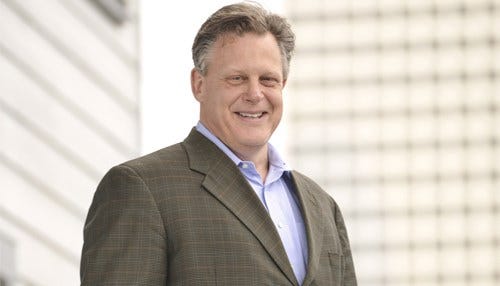Broecker: It’s Not About Other Places

Subscriber Benefit
As a subscriber you can listen to articles at work, in the car, or while you work out. Subscribe NowThe chief executive officer of the Indiana Biosciences Research Institute says the $360 million initiative is on its way to becoming "a catalyst for a much larger innovation community." David Broecker says the IBRI will soon move into temporary space and should have its first researchers on board in 60 to 90 days. The ultimate goal is to move into new space that is large enough to accommodate 150-200 researchers and their teams. In an interview on Inside INdiana Business Television, Broecker said he's not interested in duplicating what's being done in other places, but rather creating a research engine that is unique to Indiana.
"There are so many unique things about Indiana and Indianapolis, in particular," said Broecker. "With the people, players and assets, we can do our own thing and be equally as important and impactful as those other places."
The IBRI was officially announced in May 2013, billed as the nation's first industry-led biosciences research institute. The effort boasts support from some of the state’s biggest corporate players, including Eli Lilly and Co., Dow AgroSciences LLC and Cook Group Inc. Top academic players, including Indiana University, Purdue University and the University of Notre Dame are also engaged as are state and local government.
After months of behind-the-scenes prep work, countless meetings and planning sessions, signs of an organization are beginning to emerge.
Broecker says he has hired two employees — a chief of staff and business development executive — and expects to hire the institute’s first two researchers in the fall.
The IBRI has also signed a lease to begin operations in temporary space in the Indiana University Biotech Research and Training Center on West 16th Street. The building will provide IBRI with about 25,000 square feet of laboratory space, enough to accommodate up to 50 researchers and their teams. The institute will take possession of the space September 1st.
When the institute is complete, researchers will focus on metabolic diseases — diabetes, heart disease, and obesity — and collaborate with industry partners, academic institutions and other researchers around the globe.
And Broecker sees the IBRI as a catalyst for a much larger innovation-driven development in an area near the former Bush Stadium in Indianapolis that is being branded as 16 Tech — about 50 acres between 10th and 16th Streets and Indiana Avenue and the White River.
Baltimore-based Wexford Science and Technology was selected to develop plans for a life sciences and biotech development with the IBRI serving as an anchor.
Broecker envisions a world class "innovation community" similar to well-known research centers like Kendall Square in Boston. "Kendall Square is known worldwide as a place that attracts talent," said Broecker, who spent time in Boston as chief executive officer of biotech firm Alkermes Inc.
"It's an entrepreneurial community, surrounded by Harvard and MIT and you have a unique place that thrives on research, talent and entrepreneurship. That's exactly what we are trying to establish."
But Broecker is quick to point out that Indiana has what it takes to build its own, unique research center. "Everybody wants to look at other places and be like them… it's not about trying to be like other places," said Broecker. "We've got the IU Med School, IUPUI, we're proximate to key stakeholders. I really believe it can rival something like you see in Boston or San Francisco and places like that."
Funding for the $360 million project is to come from a mix of private, public and philanthropic sources. Less than five months after its launch, the IBRI announced it had raised $25 million to match $25 million approved by the Indiana General Assembly. Broecker expects to announce that another $100 million has been raised by the end of 2015.
